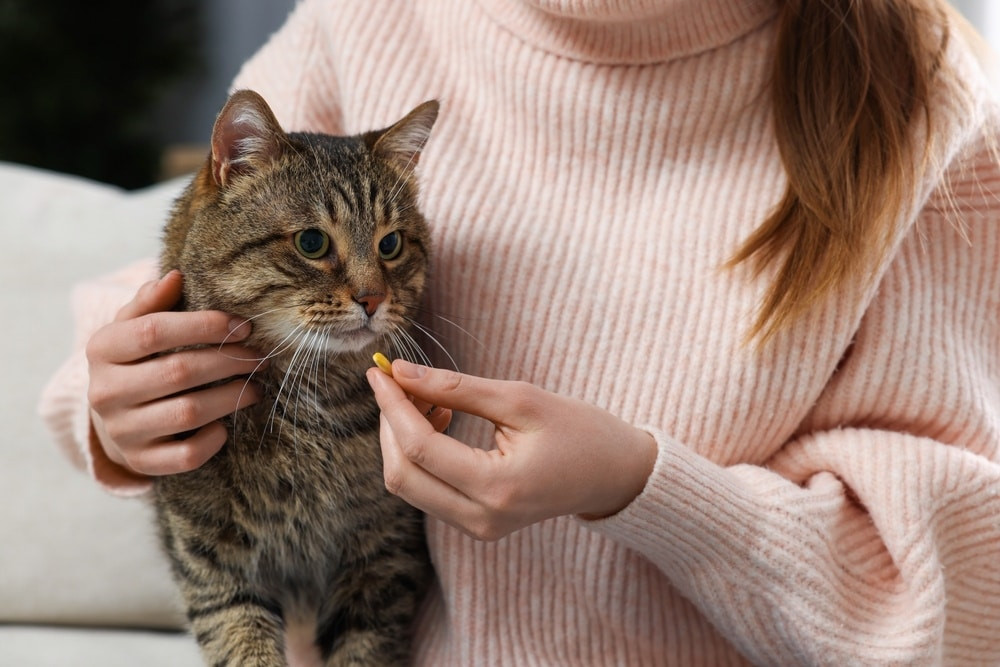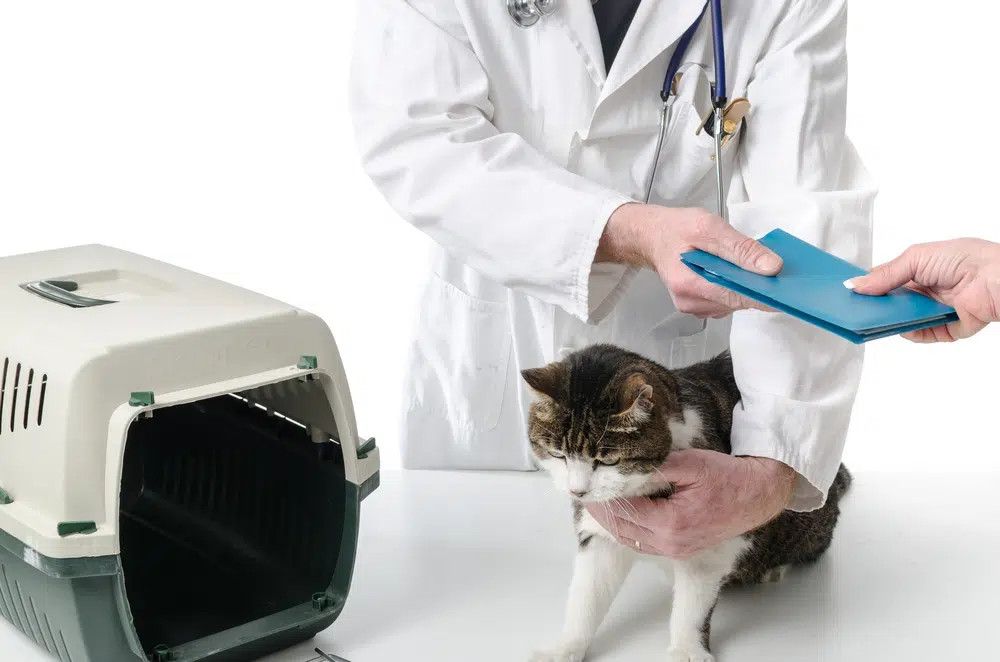Prednisone is a frequently prescribed medication in veterinary medicine, used across various animal species, including our feline companions. If you’re a cat owner, you’ve likely encountered prednisone or its close relative, prednisolone. While common, understanding these medications is crucial for responsible pet ownership. This guide will delve into the world of prednisone and prednisolone for cats, clarifying their uses, administration methods, potential side effects, and addressing concerns around their safety, particularly the phrase “Prednisone Killed My Cat.”
Understanding Prednisone and Prednisolone
Although often used interchangeably, prednisone and prednisolone are distinct yet similar medications. Both are synthetic glucocorticoids, a type of steroid. These steroids, produced naturally by the adrenal glands, influence virtually every tissue within the body. Prednisone, upon entering the body, is rapidly converted by the liver into prednisolone, which is the active form responsible for the therapeutic effects. However, cats are unique in this process. Unlike many other animals, cats don’t efficiently convert prednisone to prednisolone. Therefore, veterinarians typically prescribe prednisolone directly for cats to ensure optimal efficacy. Throughout this discussion, when we refer to prednisone use in cats, it’s with the understanding that prednisolone is the preferred and often prescribed form.
 PangoVet
PangoVet
What Conditions in Cats are Treated with Prednisolone?
It’s only a slight exaggeration to say that prednisolone is used for a wide range of feline ailments. Its versatility stems from its potent anti-inflammatory and immunosuppressive properties. The primary applications of prednisolone in cats include:
-
Inflammation Control: Prednisolone is a powerful anti-inflammatory agent. It’s frequently used to manage chronic inflammatory conditions such as:
- Gingivitis (gum inflammation)
- Bronchitis (inflammation of the airways)
- Inflammatory Bowel Disease (IBD)
- Various skin conditions (allergies, dermatitis)
- Certain types of cancer where inflammation is a contributing factor.
This anti-inflammatory action is often the primary reason your veterinarian might prescribe prednisolone for your cat.
-
Immunosuppression: In cases where a cat’s immune system is overactive, leading to autoimmune diseases or allergic reactions, prednisolone can help suppress this excessive immune response. Conditions like pemphigus or immune-mediated hemolytic anemia might necessitate prednisolone for immune system modulation.
-
Glucocorticoid Replacement Therapy: Although rare, some cats may suffer from adrenal gland insufficiency, such as Addison’s disease, or adrenal tumors that disrupt glucocorticoid production. In these cases, prednisolone can act as a replacement hormone, restoring essential physiological balance.
Administering Prednisolone to Your Cat
Prednisolone is available in several formulations to suit different needs and administration routes: tablets, oral liquids, injectable solutions, and even eye drops. Veterinarians often administer injections in the clinic setting for immediate action, but for ongoing treatment at home, tablets or liquid forms are typically prescribed.
The dosage and frequency of prednisolone administration are highly dependent on the specific condition being treated and its severity. Your veterinarian will determine the optimal dosage, which may range from once or twice daily to every other day. For once-daily dosing, administering prednisolone in the evening may be recommended to align with a cat’s natural glucocorticoid rhythms.
To minimize potential side effects associated with higher doses and prolonged use, veterinarians prioritize prescribing the lowest effective dose for the shortest duration necessary. Treatment often begins with a higher dose to quickly address the condition, followed by a gradual reduction to a maintenance dose or less frequent administration as the cat improves. When discontinuing prednisolone, it’s crucial to taper the dose gradually over a week or more, as abrupt cessation can disrupt the cat’s natural glucocorticoid production and lead to withdrawal symptoms. Always adhere strictly to your veterinarian’s instructions regarding dosage and tapering schedules.
 woman-giving-pill-to-cat
woman-giving-pill-to-cat
What if You Miss a Dose of Prednisolone?
It’s understandable to occasionally miss a dose, especially with complex medication schedules. If you realize you’ve missed a dose, administer it as soon as you remember. However, if it’s close to the time for the next scheduled dose, skip the missed dose and continue with the regular dosing schedule. Never double up on doses to compensate for a missed one, as this can increase the risk of side effects. If you have concerns about missed doses, consult your veterinarian for guidance.
Potential Side Effects of Prednisolone in Cats
Like all medications, prednisolone can cause side effects in cats. Many cats experience some side effects, particularly initially, but they are often manageable and less concerning than the untreated condition.
Common side effects you might observe include:
- Increased Appetite: Prednisolone can stimulate appetite, leading to your cat eating more than usual.
- Increased Thirst (Polydipsia): You may notice your cat drinking significantly more water.
- Increased Urination (Polyuria): Increased water intake naturally leads to increased urine production and more frequent trips to the litter box.
With long-term or high-dose prednisolone use, more pronounced side effects can emerge:
- Vomiting: Some cats may experience nausea and vomiting.
- Diarrhea: Digestive upset can manifest as diarrhea.
- Increased Panting: While cats don’t pant as readily as dogs, increased respiratory rate or panting can occur, especially in hot weather or after exertion.
- Weight Gain: Increased appetite coupled with metabolic changes can lead to weight gain over time.
- Lethargy or Depression: While less common, some cats may become less active or appear depressed.
- Behavioral Changes: Irritability or aggression can occur in some cats on prednisolone.
Crucially, if you observe any alarming signs in your cat while they are on prednisolone, such as:
- Loss of appetite or refusal to eat
- Bloody stools
- Changes in coat condition (hair loss, thinning)
- Marked aggression or significant behavioral changes
- Any other unusual or concerning symptoms
Seek veterinary attention immediately. Your veterinarian can assess the situation, determine if the side effects are related to prednisolone, and adjust the treatment plan if necessary. Veterinarians always aim to minimize side effects by prescribing the lowest effective dose for the shortest possible duration.
 divider 1 paws
divider 1 paws
Frequently Asked Questions about Prednisolone and Cats
Is Prednisone Dangerous for Cats? Could Prednisone Have “Killed My Cat?”
It’s understandable to be concerned about medications, especially when you hear alarming phrases like “prednisone killed my cat.” However, prednisone, or more accurately, prednisolone, is not inherently dangerous for cats when used appropriately and under veterinary supervision. The statement “prednisone killed my cat” is almost certainly a misunderstanding or misattribution of cause. Prednisolone, like any potent medication, has potential side effects, and in very rare circumstances, serious complications could arise. However, these are typically associated with underlying health conditions, inappropriate dosing, or lack of veterinary monitoring, not the medication itself.
Prednisolone is a valuable and often life-saving medication for cats when used correctly. It’s crucial to remember that cats metabolize prednisone poorly, making prednisolone the preferred choice. If a cat experiences adverse effects, it’s usually due to the underlying condition, inappropriate dosage, or individual sensitivity, not a direct “killing” effect of the drug itself. If you are concerned about your cat’s health while on prednisolone, the most important step is to communicate openly and promptly with your veterinarian.
How Long Can a Cat Safely Take Prednisolone?
The duration of prednisolone treatment varies significantly depending on the condition being treated. Veterinarians always strive for the shortest effective course of treatment to minimize potential long-term side effects. Generally, if a cat requires prednisolone for more than 2-3 months, a thorough re-evaluation is warranted. Long-term steroid use can have more significant side effects, and your veterinarian will want to reassess the diagnosis, explore alternative treatment options, and ensure prednisolone remains the most appropriate choice. In some chronic conditions, long-term, low-dose prednisolone may be necessary to maintain quality of life, but this is always carefully managed and monitored by a veterinarian.
 vet-giving-cat-health-record
vet-giving-cat-health-record
Will Prednisolone Change My Cat’s Personality?
Prednisolone can influence a cat’s behavior, although significant personality changes are not typical at standard doses. Some cats may exhibit:
- Increased restlessness or activity levels.
- Increased appetite, potentially leading to begging for food more frequently.
- In some cases, increased irritability or mild aggression.
These behavioral changes are usually more pronounced at higher doses or with long-term use. If you notice concerning behavioral shifts in your cat while they are on prednisolone, and these changes are impacting their well-being or your household, consult your veterinarian. They can help determine if the behavior is medication-related and if dose adjustments or management strategies are needed.
In Conclusion
Prednisolone (often referred to as prednisone in general discussions) is a cornerstone medication in feline veterinary care, particularly for managing inflammatory and immune-mediated conditions like bronchitis, skin allergies, and gingivitis. While prednisolone use can be associated with side effects, most are manageable and transient, especially when the medication is used judiciously under veterinary guidance. The benefits of prednisolone in alleviating suffering and improving quality of life often outweigh the potential risks when used appropriately. Always maintain open communication with your veterinarian regarding your cat’s health and any concerns you have about prednisolone treatment. Working together, you can ensure your cat receives the best possible care and minimizes any potential negative impacts of medication.
Sources:
- Link to a reputable veterinary source on Prednisolone, e.g., Veterinary Information Network (VIN)
- Link to a reputable animal pharmaceutical resource, e.g., Plumb’s Veterinary Drug Manual
- Link to a relevant article from a veterinary journal, e.g., Journal of Veterinary Internal Medicine (Replace with actual links to credible sources)
How useful was this post?
Click on a star to rate (you can leave written feedback after clicking submit)
Help us improve Catster for pet parents!
Your feedback really matters.
What did you like about this post? Also how can we improve it?
